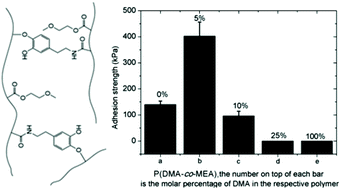The effect of molecular composition and crosslinking on adhesion of a bio-inspired adhesive†
Abstract
In this article, catechol-functionalized polymers are synthesized by free radical polymerization of dopamine methacrylamide (DMA) and 2-methoxyethyl methacrylate (MEA) at 60 °C in DMF. By varying the DMA content in the polymer, it is found that during free radical polymerization, the catechol groups in DMA react with the propagating radicals, resulting in the formation of a crosslinked structure. We systematically study the effect of DMA content and crosslinking on the adhesion properties of the polymers. Under both dry and wet conditions, maximum adhesion is obtained for a polymer composed of 5 mol% DMA. This polymer exhibits an optimum balance between the catechol content to strengthen the interface, compliance to ensure good contact formation and cohesive strength to resist separation. An increase in the crosslinking degree of the polymer resulted in reduced dry adhesion.


 Please wait while we load your content...
Please wait while we load your content...